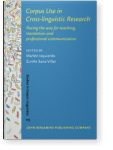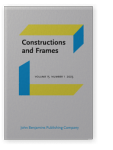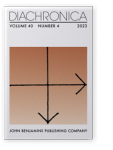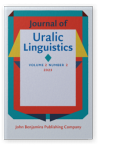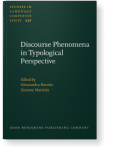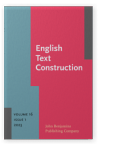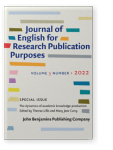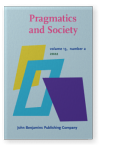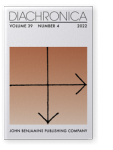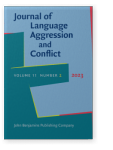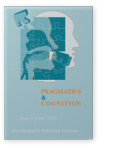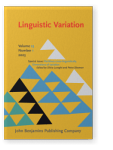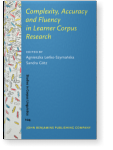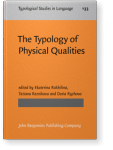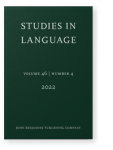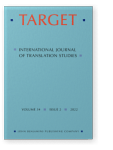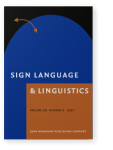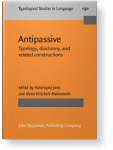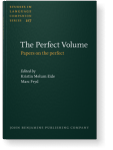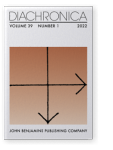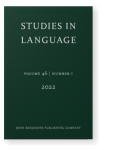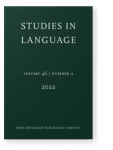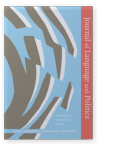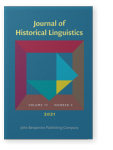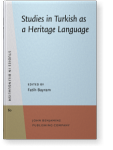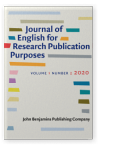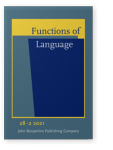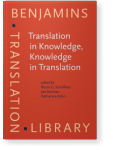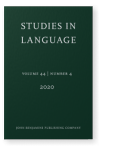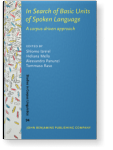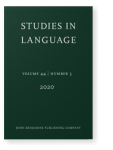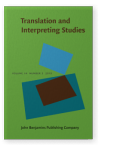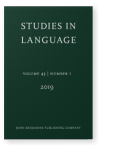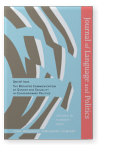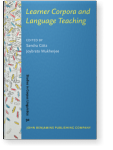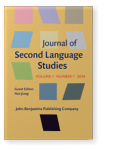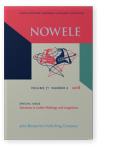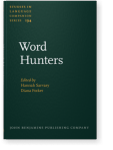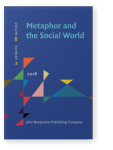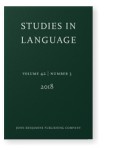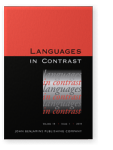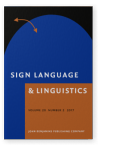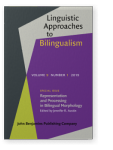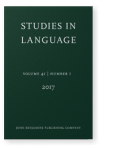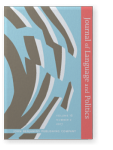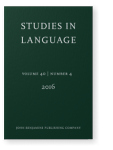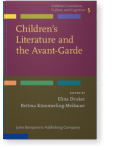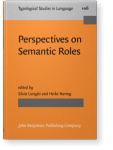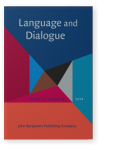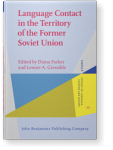National Research University Higher School of Economics
List of John Benjamins publications for which someone affiliated with National Research University Higher School of Economics plays a role.
Title
2023 Word alignment in the Russian-Chinese parallel corpus
In: Corpus Use in Cross-linguistic Research: Paving the way for teaching, translation and professional communication[Studies in Corpus Linguistics, 113] pp. 195–215
Keywords word alignment | gold dataset | linguistic guideline | deep learning | language model
2023 From data to theory: An emergent semantic classification based on the large-scale Russian constructicon
Keywords Construction Grammar | constructicon | Russian | semantics | corpus
2023 Linguistic mechanisms of colour term evolution: A diachronic investigation of “Russian browns” buryj and koričnevyj
Keywords “Russian browns” | computational linguistics | Google Books Ngram | colour term collocational dynamics | diachronic distributional analysis | linguistic colour term evolution
2023 Case and agreement puzzle in the Moksha debitive
Keywords Moksha | Uralic | dative case | dative-infinitive constructions | agreement | Dependent Case Theory
2023 Towards pragmatic construction typology: The case of discourse formulae
In: Discourse Phenomena in Typological Perspective[Studies in Language Companion Series, 227] pp. 35–63
Keywords discourse formulae | negative replies | lexical typology | frame-based approach | construction grammar
2023 Creating an information security policy in a bank: Linguistic aspects
Keywords information | information security policy | corpus | corpus linguistics | corpus-driven
2022 Citation in global academic knowledge making: A paired text history methodology for studying citation practices in English and Russian
Keywords academic writing | citation practices | literacy brokers | Russian scholars | writing multilingually | академическое письмо | практики цитирования | посредники грамотности | российские исследователи | письмо на разных языках
2022 Clean room, uncomfortable bed: A corpus analysis of evaluation devices in hotel reviews
Keywords hotel reviews | evaluation theory | Appraisal framework | evaluation devices | corpus analysis
2022 Drastic demographic events triggered the Uralic spread
Keywords Uralic | Finno-Ugric | Indo-European | Yamnaya | Indo-Iranian | Siberia | Eurasia | Seima-Turbino | 4.2 ka event | linguistic homeland
2022 Journalistic practice in the international press corps: Adversarial questioning of the Russian President
Keywords aggressive questioning | journalistic norms | media systems | Russian media
2023 Modular vs. diagrammatic reasoning: The pragmatist side of human understanding
Keywords reasoning | inference | modular mind | Mercier & Sperber | Peirce | pragmaticism | logical diagrams | logical graphs
2022 The second genitive in the history of Russian and across its dialects
Keywords Russian | Russian dialects | genitive | partitive | morphological recycling | language contact | pattern borrowing
2022 Accuracy, syntactic complexity and task type at play in examination writing: A corpus-based study
In: Complexity, Accuracy and Fluency in Learner Corpus Research[Studies in Corpus Linguistics, 104] pp. 241–272
Keywords syntactic complexity | accuracy | EFL/ESL writing | assessing writing
2022 Introduction: The frame-based approach to the typology of qualities
Keywords lexical typology | physical qualities | metaphor | frame | evaluation | perception
2022 Constructing a typological questionnaire with distributional semantic models
Keywords lexical typology | questionnaire | distributional semantic models | physical qualities
2022 Methodology at work: Semantic fields sharp and blunt
Keywords lexical typology | frame-based approach | semantic maps | metaphors | physical qualities | sharp, blunt
2022 A matter of degree?: The domain of wetness in a typological perspective
Keywords physical qualities | semantics of degree | wetness | lexical typology
2022 Typology of dimensions
Keywords dimensional terms | lexical typology | semantic maps | spatial expressions
2022 The domain of surface texture
Keywords lexical typology | intragenetic typology | corpus research | metaphoric shift | Uralic languages
2022 A new approach to old studies
Keywords qualitative adjectives | semantics of oldness | lexical typology | semantic maps
2022 Periphrastic causative in West Circassian
Keywords West Circassian | morphosyntax | causative construction
2021 Appearances: Character description as a network of signification in Russian translations of Jane Eyre
Keywords character description | Antoine Berman | networks of signification | Charlotte Brontë | literary portrait | translation variation
2021 Linearization constraints on sentential negation in Russian Sign Language are prosodic
Keywords Russian Sign Language | negation | syntax | prosody
2021 Indirect antipassive in Circassian
In: Antipassive: Typology, diachrony, and related constructions[Typological Studies in Language, 130] pp. 483–514
Keywords Circassian languages | polysynthesis | intransitive verbs | lability | applicatives
2021 Structural and functional variations of the perfect in the Lezgic
languages
Keywords East Caucasian languages | perfect | resultative | indirect evidential | aorist | tense and aspect systems | grammaticalization
2021 A Bayesian approach to the classification of Tungusic languages
Keywords Tungusic languages | language classification | Bayesian phylogenetics | family time depth | basic vocabulary | language phylogeny
2021 A nonstandard type of affix reordering: The restrictive kə̄n in Ulcha
Keywords Tungusic | Ulcha | restrictive | affix reordering | externalization of inflection | degrammaticalization
2021 SAY-complementizers and indexical shift in Poshkart Chuvash: With emphasis on communicative reception reports
Keywords Chuvash | Turkic | SAY-complementizers | verbs of hearing | speech reports | indexical shift | logophoricity | action nominalizations
2021 “It is in the nation-state that democracy resides”: How the populist radical right discursively manipulates the concept of democracy in the EU parliamentary elections
Keywords populist radical right | populism; democracy | radical right | liberal democracy | political discourse | European Union | European elections
2021 Lexical diachronic semantic maps: Mapping the evolution of time-related lexemes
Keywords semantic maps | lexical typology | diachronic lexical semantics | co-expression | ancient Egyptian | ancient Greek
2020 How to build a constructicon in five years: The Russian example
Keywords constructicon | construction grammar | Russian | corpus
2020 First language exposure predicts attrition
patterns in Turkish heritage speakers’ use of
grammatical evidentiality
Keywords evidentiality | narrative speech | heritage language speakers | Turkish-Dutch bilingualism
2020 Discipline and methodological paradigm: A case study of EAL scholars’ perceptions of research writing in political science
Keywords research writing | multilingual scholars | EAL | disciplinary norms | methodological paradigm | epistemic stance | научное письмо на английском языке | дисциплинарные нормы | методологическая парадигма | эпистемическая позиция
2020 Lexical stress variation and rhythmic alternation in Russian: A pilot study
Keywords lexical stress | rhythm | Russian language | stress variation
2020 On the polysemy of motion verbs in Ancient Greek and Coptic: Why lexical constructions are important
Keywords lexical constructions | polysemy | motion verbs | Ancient Greek | Coptic (Sahidic dialect)
2020 An (imagined) community: The Translation Project in the Social Sciences and its
impact on the scientific community in post-Soviet Russia
In: Translation in Knowledge, Knowledge in Translation[Benjamins Translation Library, 154] pp. 249–268
Keywords Post-Soviet Russia | human sciences | social sciences | the Translation Project | Soros Foundation
2020 Knowledge in series: Central European positivisms and their media, 1860–1900
In: Translation in Knowledge, Knowledge in Translation[Benjamins Translation Library, 154] pp. 145–168
Keywords positivism | serial publishing | nineteenth-century Central Europe | translations into Polish and Czech
2020 From verb to New Event Marker: A new look at the Hittite pai- and uwa- constructions
Keywords motion verbs | New Event Marker | deictic center | constructionalization
2020 The risks of misunderstandings in family discourse: Home as a special space of interaction
Keywords family discourse | miscommunication | common ground fallacy | overguessing | recipient design
2020 Narrative discourse segmentation in clinical linguistics
In: In search of basic units of spoken language: A corpus-driven approach[Studies in Corpus Linguistics, 94] pp. 257–284
Keywords discourse segmentation | corpus annotation | aphasic discourse | aphasia | Pear stories retellings | Russian
2020 Topicality in Sentence Focus utterances
Keywords sentence focus | inferential | topicality | givenness | subject
2019 Borrowing from an unrelated language in support of intragenetic tendencies: The case of the conditional clitic =sa in Udi
Keywords language contact | contact-induced change | clitic borrowing | matter borrowing | conditional mood | indefinite pronouns | Udi | Nakh-Daghestanian | Azerbaijani | Turkic
2019 From International Literature to world literature: English translators in 1930s Moscow
Keywords
International Literature
| world literature | Georg Lukács | Bertolt Brecht | Isaac Babel
2018 Early and late learners decompose inflected nouns, but can they tell which ones are inflected correctly?
Keywords heritage speakers | second language learners | morphology | lexical access | inflection | decomposition | second language processing | nonnative proficiency | lexical decision task | auditory word recognition
2018 Denominal verbs with metaphorical meanings in British business media discourse: A corpus analysis of articles in the “Financial Times”
Keywords denominal verb | corpus analysis | morphological metaphor | word formation | business media discourse
2018 Gender agreement alternation in Aqusha Dargwa: A case against information structure
Keywords Aqusha Dargwa | gender agreement | sentence topic | biabsolutive construction
2018 Notions of “money” and “house” in the language consciousness of Russians and the Japanese
Keywords money | house | language | culture | Russian/Japanese
2018 On the notion of metaphor in sign languages: Some observations based on Russian Sign Language
Keywords metaphor | iconicity | Russian Sign Language
2017 A case for agreement: Processing of case inflection by early and late learners
Keywords Russian inflectional morphology | second language | heritage speakers
2017 Liberal articulations of the ‘Enlightenment’ in the Greek public sphere
Keywords Crisis | Greece | biopolitics | Europe | modernity | liberals | Enlightenment
2017 The hypothesis of insubordination and three types of wh-exclamatives
Keywords semantics of exclamatives | syntax of exclamatives | hypothesis of insubordination | embedded wh-exclamatives | typology of exclamatives
2014 Developing a method for cross-cultural dialogue with Chinese: A report on the process
Keywords ‘outsider’ | Mediterranean-based | linguistic | dialogue | Chinese | context | steps | practical | Confucius
Izhma Komi in Western Siberia: At the crossroads of language contact
In: Language contact in the territory of the former Soviet Union[IMPACT: Studies in Language, Culture and Society, 50] pp. 119–142
Keywords Uralic languages | Izhma Komi | Nenets | Khanty | Russian | contact-induced change | loan translation
